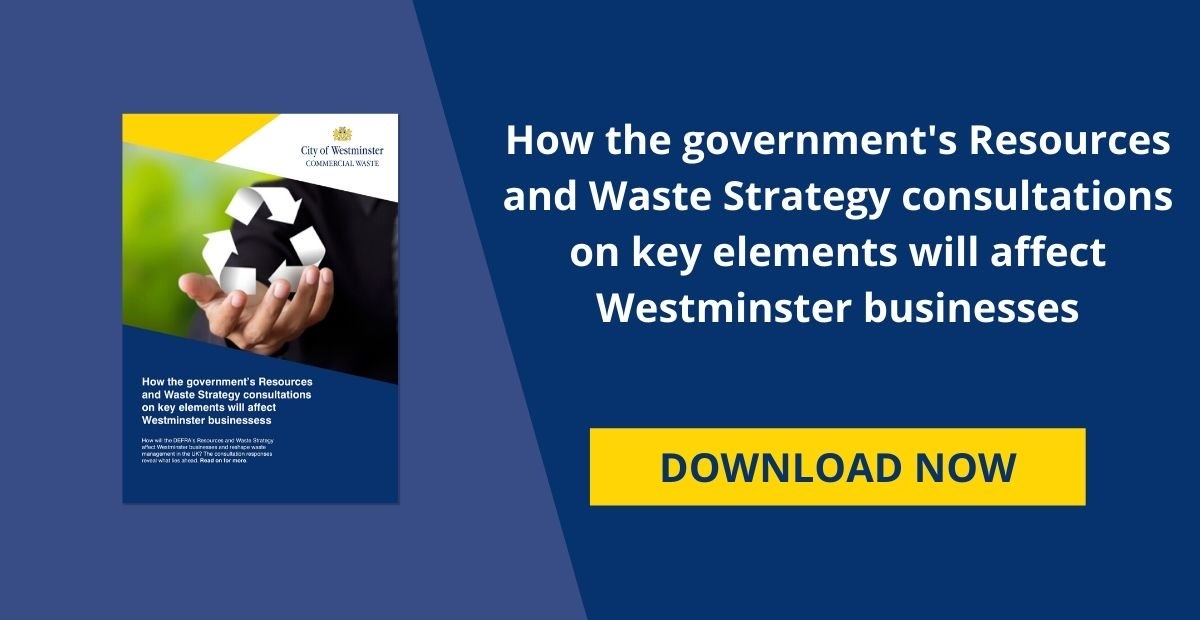Following the launch of the Department of Food Environment and Rural Affairs (DEFRA) Resources and Waste Strategy (RWS) at Veolia’s Southwark Integrated Waste Management Facility in December 2018, the government launched four individual consultations on the key elements of RWS. This will affect most businesses and shape the future of the UK’s waste management services including those provided by local authorities. The ultimate aim of RWS is for the UK to better manage its waste and become more resource-efficient over the next few years. RWS will also encourage easy to recycle products and better waste management behaviour by businesses.
The 4 consultations on key RWS elements – how are businesses affected?
1. Improving Collection Consistency
Impact: High
Improving how the UK recycles is the key aim of this RWS element. DEFRA wants everyone, both households and businesses, to segregate their waste for recycling in a similar and consistent way, improving the quality of what is collected. The impact of the Collection Consistency consultation on Westminster businesses is high as you will be expected to recycle more effectively. Data on business waste and recycling performance will be gathered in order to steer performance, and this consultation proposes to make it mandatory for businesses to segregate all of their recycling, including food waste.
Read more on the full consultation responses
2. Reforming packaging use through Extended Producer Responsibility (EPR) for packaging
Impact: High
The goal of EPR is to reduce the use of difficult to recycle packaging materials, and encourage and reward the use of easily recycled and environmentally friendly (sustainable) packaging. If your business packages products for customers, the impact could be relatively high as you will be responsible for the costs of collecting, recycling or disposing of packaging waste. It will become mandatory for packaging to be clearly labelled as either recyclable or non-recyclable. Nearly all retailers will be affected by EPR and a number of hospitality sector businesses will be involved here as well.
Read more on the EPR consultation responses
3. Creating a UK-wide plastic packaging tax
Impact: Medium
A well-functioning recycling market will not work without a demand for recovered materials. Even though the UK is making great progress around manufacturing new products and materials with recycled content, there needs to be more improvement around plastic packaging. The HM Treasury (HMT) asked for the nation’s view on implementing a new tax on all plastic packaging products with less than 30% recycled content.
Westminster businesses who produce, distribute or import plastic packaging will be affected and need to take steps to ensure the products put on the market comply with the new requirements.
Read more on the plastic packaging tax consultation responses
4. Introducing a Deposit Return Scheme (DRS)
Impact: Medium
Preventing packaging from becoming waste in the first place is the key aim of DRS. Businesses that sell drinks containers will be expected to take them back from the public for recycling, for example, through reverse vending machines. The cost of the deposit will be added to the price of the drink, which is then redeemed once the empty drink container is returned to a designated return point. We expect DRS to have a medium impact on Westminster businesses as they will need to consider how their establishment can accommodate the DRS scheme.
At WCC we are already thinking ahead. Through Veolia, we are testing a number of reverse vending solutions, such as in Kings Cross Central. The DRS will cover most plastic drinks packaging such as cans and PET or HDPE plastic bottles and potentially glass bottles as well. Hospitality businesses and catering providers will also be affected by DRS.
Read more on the DRS consultation responses
What happens next?
In order to incorporate as many wide-ranging views on what will be implemented under RWS, the central government is launching further consultations on the finer details of the regulatory regime.
After receiving consultation responses from the business community, the government will continue to do more research and analysis based on the feedback and further engage with stakeholders to discuss these matters. The second consultation period will be introduced in the coming new year. After the final consultation amendments are incorporated into legislation, the plastic packaging tax is expected to be adopted by April 2022 and the EPR,
Consistency of Collections and the DRS will be implemented no later than 2023.
The Queen’s Speech on 14 October 2019 revealed a number of next steps around RWS, including the long-awaited Environment Bill. This will deliver RWS and set out a ‘base legislation’ upon which all subsequent legislation will follow. Since most current environmental legislation in the UK is based on EU regulations, the Environment Bill will set out a framework for environmental improvement after the UK leaves the EU.
The Environment Bill covers a wide range of environmental issues including four priority areas:
- Air quality
- Water
- Biodiversity
- Resource efficiency and waste reduction
The Environment Bill is expected to be officially published this autumn 2019. Read DEFRA’s press release for more on the publication of the Bill.
Read up on the Environment Bill itself for more information
Commercial Waste Services
Commercial Waste Services is closely involved with the development of RWS and we want to ensure that the proposed improvements will bring all the intended benefits. As such, we want to keep you up to date on the many changes that will head our way in the coming years. We can assist you in making preparations to ensure that you remain compliant with future regulations. We would be delighted to help you stay ahead of the game, just contact us for an appointment with your local commercial waste services expert.
For a summary of the RWS consultations, please download this version we created for you.





